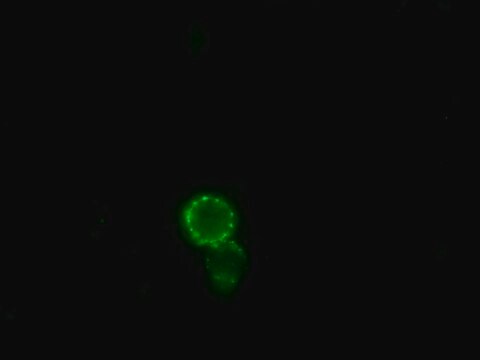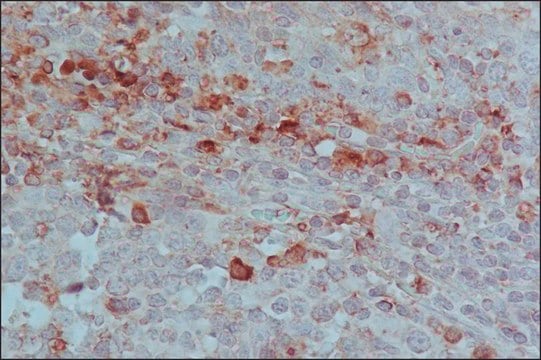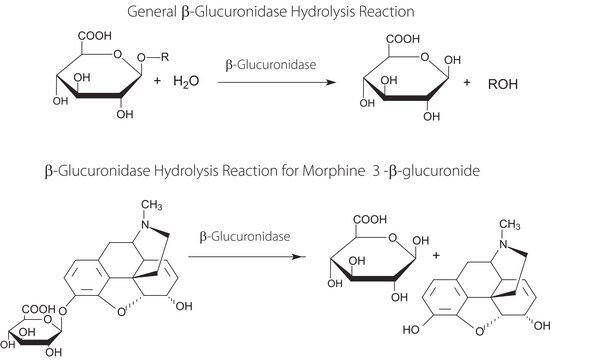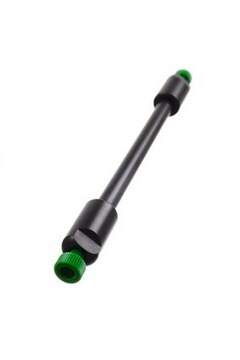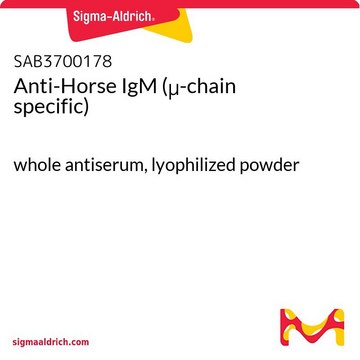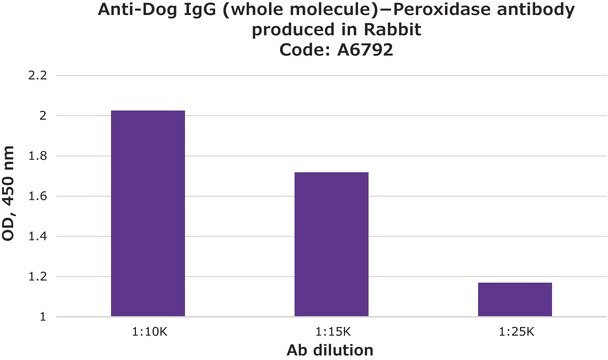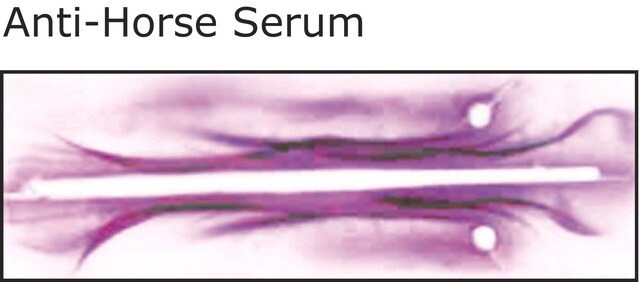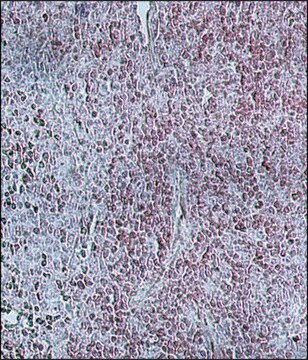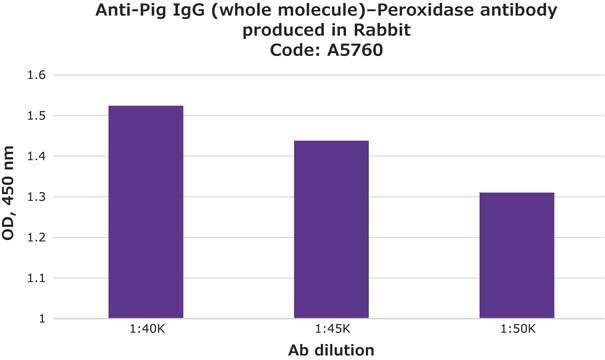A6917
Anti-Horse IgG (whole molecule)−Peroxidase antibody produced in rabbit
affinity isolated antibody, buffered aqueous solution
Synonym(s):
Rabbit Anti-Horse IgG (whole molecule)−HRP
Sign Into View Organizational & Contract Pricing
All Photos(1)
About This Item
Recommended Products
biological source
rabbit
Quality Level
conjugate
peroxidase conjugate
antibody form
affinity isolated antibody
antibody product type
secondary antibodies
clone
polyclonal
form
buffered aqueous solution
technique(s)
direct ELISA: 1:10,000
shipped in
dry ice
storage temp.
−20°C
target post-translational modification
unmodified
Looking for similar products? Visit Product Comparison Guide
Related Categories
General description
An immunoglobulin has two heavy chain and two light chain connected by disulfide bond. It mainly helps in immune defense. It is a glycoprotein. IgG is a major class of immunoglobulin. Horse IgG has different subclasses, IgG2a, IgG2b, IgG2c, IgG1 and IgG(T). Compared to other IgG molecules, IgG(T) has more carbohydrate content. In healthy individuals, total IgG is dispersed equally between circulating plasma and interstitial fluids.
Horse IgG is a plasma B cell derived antibody isotype defined by its heavy chain. IgG is the most abundant antibody isotype found in horse serum. IgG crosses the placental barrier, is a complement activator and binds to the Fc-receptors on phagocytic cells. The level of IgG may vary with the status of disease or infection.
Immunogen
Purified horse IgG
Application
Anti-Horse IgG (whole molecule)-Peroxidase antibody produced in rabbit has been used in:
- enzyme-linked immunosorbent assay (ELISA)
- HeV soluble G
- indirect ELISA (HeVsG iELISA)
Biochem/physiol Actions
Equine IgG antibodies mainly regulate mucosal and systemic immunological responses and thereby, provide protection against disease-causing pathogens such as Streptococcus equi, and the horse flu virus. Horse IgG may also function to control the advancement of EHV-1 infection .
Immunoglobulin G (IgG) participates in hypersensitivity type II and type III.
Physical form
Solution in 0.01 M phosphate buffered saline, pH 7.4 containing 1% bovine serum albumin and 0.05% MIT
Preparation Note
Prepared using the periodate method described by Wilson, M.B., and Nakane, P.K., in Immunofluorescence and Related Staining Techniques, Elsevier/North Holland Biomedical Press, Amsterdam, p215 (1978).
Disclaimer
Unless otherwise stated in our catalog or other company documentation accompanying the product(s), our products are intended for research use only and are not to be used for any other purpose, which includes but is not limited to, unauthorized commercial uses, in vitro diagnostic uses, ex vivo or in vivo therapeutic uses or any type of consumption or application to humans or animals.
Not finding the right product?
Try our Product Selector Tool.
Signal Word
Warning
Hazard Statements
Precautionary Statements
Hazard Classifications
Skin Sens. 1
Storage Class Code
12 - Non Combustible Liquids
WGK
WGK 2
Flash Point(F)
Not applicable
Flash Point(C)
Not applicable
Choose from one of the most recent versions:
Already Own This Product?
Find documentation for the products that you have recently purchased in the Document Library.
Customers Also Viewed
Eliane Cristina de Freitas et al.
Microbiology (Reading, England), 165(3), 355-365 (2019-01-29)
Upstream open reading frames (ORFs) are frequently found in the 5'-flanking regions of genes and may have a regulatory role in gene expression. A small ORF (named cohL here) was identified upstream from the copAB copper operon in Xanthomonascitri subsp.
Margot Camoin et al.
BioMed research international, 2019, 2964639-2964639 (2019-12-31)
Surra, caused by Trypanosoma evansi, is a widely distributed animal trypanosomosis; it affects both domestic and wild mammals with high economic impact. Clinical picture is moderate in bovines but severe in equids. Surra is also an important constraint for international
Advances in Immunology, 575-586 (1964)
Distribution and feeding preference of the sand flies Phlebotomus sergenti and P. papatasi in a cutaneous leishmaniasis focus in Sanliurfa, Turkey
Svobodova M, et al.
The American Journal of Tropical Medicine and Hygiene, 68(1), 6-9 (2003)
Can equids be a reservoir of Leishmania braziliensis in endemic areas
Truppel JH, et al.
PLoS ONE, 9(4), e93731-e93731 (2014)
Our team of scientists has experience in all areas of research including Life Science, Material Science, Chemical Synthesis, Chromatography, Analytical and many others.
Contact Technical Service
